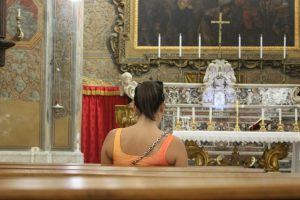When I was growing up in the pre-Second Vatican Council Catholic Church, the rules of financial transparency in parishes were straightforward: There were none. The unwritten rule was that lay Catholics were to pray, pay, and obey. There was no thought of involving them in, or even informing them about, the church’s financial matters. The closest I can recall to any level of transparency was the year my pastor made the ill-advised decision to publish a booklet listing each parishioner’s financial contributions to the parish. Fortunately, this was a one-time occurrence.
Vatican II changed things dramatically. Now, the church asks parishioners and clergy to collaborate. Parishes establish institutions, such as parish finance and pastoral councils, to facilitate this collaboration. There are similar structures at the diocesan level.
These structures provide the mechanisms for financial transparency. Parish finance councils advise the pastor on financial matters and monitor the parish’s financial condition. Pastoral councils help the pastor with parish priorities and planning. Ideally, the two work together to ensure that the parish’s budget reflects its priorities. During this process, parishioners become aware of parish finances and what they are used for.
Most parishes make some financial information available. . . . But these actions are minimal and don’t go far enough.
Advertisement
Unfortunately, not every pastor was prepared for this level of collaboration after Vatican II. Neither were many parishioners, some of whom preferred their passive pre-Vatican II role. In too many instances parish finance and pastoral councils existed only on paper. In other cases they did nothing more than rubber-stamp everything the pastor wished to do. Even those groups that took their roles seriously did not always feel the necessity of keeping their fellow parishioners informed on parish financial matters.
St. Pope John Paul II set in place a new model of parishioner-clergy relationships, telling parishioners that they are co-responsible with the clergy for parish life. Pope Emeritus Benedict XVI described this model best in a 2009 address on church membership and pastoral co-responsibility at the Basilica of Saint John Lateran:
It is necessary to improve pastoral structures in such a way that the co-responsibility of all the members of the People of God in their entirety is gradually promoted. . . . This demands a change in mindset, particularly concerning lay people. They must no longer be viewed as “collaborators” of the clergy but truly recognized as “co-responsible” for the Church’s being and action, thereby fostering the consolidation of a mature and committed laity.
Seen through this lens, financial transparency is about more than preventing embezzlement, although this is important. As a human institution, the church is susceptible to the same types of financial fraud as are proprietary-sector organizations. Transparency in all parish activities, notable in financial matters, is necessary for laypeople to be involved in this co-responsibility.
Unless provided with a full picture of the parish’s financial situation, parishioners cannot carry out their fullest level of co-responsibility in all parish matters, not just those pertaining to finances.
When parishes are financially transparent, parishioners are more committed and more generous.
Studies show that when parishes are financially transparent, parishioners are more committed and more generous. A survey of 2,200 Catholics that I helped conduct found that parishioners who felt they had enough information about parish finances contributed 32 percent more than those who felt they didn’t have enough; those who felt laypeople had enough influence in parish finances contributed 26 percent more; parishioners who felt the parish leadership was financially accountable contributed 15 percent more; and those who agreed that the parish leadership discussed important parish decisions contributed 16 percent more than those who disagreed.
Most parishes make some financial information available. Many report weekly collection numbers in the parish bulletin. Most make an annual budget report. But these actions are minimal and don’t go far enough. To be truly transparent a parish should undertake the following:
Give parishioners the opportunity to comment on the parish’s preliminary budget before it becomes final
Most parishes share their final budget with their parishioners. But to be co-responsible, parishioners need the opportunity to have a say in the budget. One effective means for accomplishing this is to hold a town hall meeting where the preliminary budget is presented to the entire parish so that parishioners can comment and make suggestions. My research shows that 80 percent of regular Mass attendees approve of this approach. Parishes that engage in this practice receive 29 percent more financial contributions than those that don’t.
Share quarterly budget reports from the parish finance council that show actual versus budgeted revenue and expenditure figures
Presenting parishioners with regular updates provides them with the up-to-date information they need. This is particularly important in years with a projected budget deficit. An early warning affords parishioners the opportunity to work with parish leadership to rectify any budgetary problems before they mushroom out of hand.
Require supporting documentation from everyone who wishes to be reimbursed for expenditures made on behalf of the parish
Many parishes are lax in demanding documentation before reimbursing parishioners. Others are inconsistent, demanding them from some but not from others (such as clergy). It is important that the parish is transparent in this regard and that no one receives special treatment. This boosts confidence that only legitimate expenses are being reimbursed.
Develop conflict-of-interest guidelines
It is entirely acceptable for a parish to conduct business with its parishioners. In fact, in many situations it might be preferable. But a conflictof-interest policy should be in place to ensure no one receives special treatment. This is particularly crucial when such a transaction requires approval by the parish finance council and one of the council members is a potential vendor.
Undergo regular audits
Parishes should regularly undergo both internal audits (conducted by diocesan staff) and external audits (conducted by private accounting firms). Auditors examine parish financial procedures to ensure that financial reports are based on accurate information and advise the parish on the effectiveness of fraud-prevention systems. The resulting audit report, including any recommendations, should be shared with the entire parish. The United States Conference of Catholic Bishops recommends annual audits of parishes. My research shows that only about 3 percent of U.S. Catholic dioceses conduct annual audits. About a fifth never audit, and another 28 percent conduct an audit only when there is a change in pastor. Frequent audits provide parishioners with confidence that their parish’s finances are being conducted on a sound basis.
Financial transparency is about more than preventing embezzlement.
Advertisement
In research I conducted with my colleague Robert West, we found that 85 percent of U.S. Catholic dioceses had experienced embezzlement in the past five years. Most of this fraud was at the parish level and could have been prevented with better financial transparency.
However, that is not the most important reason for parishes to be financially transparent. Today’s parishioners expect that their parish will be conducted in a co-responsible manner with the clergy. This requires transparency from the parish leadership in all parish activities, but particularly with regard to the parish’s finances. Parishioners who feel co-responsible will be more committed to the parish. This commitment will exhibit itself in a variety of ways, including increased financial support.
This article also appears in the August issue of U.S. Catholic (Vol. 85, No. 8, pages 30-31. Click here to subscribe to the magazine.
Image: Stocksnap.io/Tevarak













Add comment